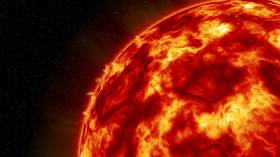China turns on nuclear-powered ‘artificial sun’, TEN TIMES hotter than the real thing

Beijing has successfully powered up its “artificial sun” nuclear fusion reactor for the first time, China’s People’s Daily reported on Friday. It’s designed to be a clean energy source, similar to the real Sun.
Made to replicate the natural reactions that occur in the sun using hydrogen and deuterium gases as fuels, the HL-2M Tokamak reactor is China's largest and most advanced nuclear fusion experimental research device.
It is located in southwestern Sichuan province and was completed late last year. The reactor is often called an "artificial sun" due to the enormous heat and power it produces.
The HL-2M Tokamak uses a powerful magnetic field to fuse hot plasma and can reach temperatures of over 150 million degrees Celsius, approximately ten times hotter than the core of the Sun.
“The development of nuclear fusion energy is not only a way to solve China’s strategic energy needs, but also has great significance for the future sustainable development of China's energy and national economy,” the People’s Daily reported.
The project is part of China’s involvement with the International Thermonuclear Experimental Reactor (ITER), based in France.
The ITER is the world’s largest nuclear fusion project with a price tag of about €20 billion ($24 billion). It involves 35 countries and is expected to be completed in 2025.
Chinese scientists have been working on developing smaller versions of the nuclear fusion reactor, including the HL-2M Tokamak, since 2006.
Fusion is considered the Holy Grail of energy and is what powers the Sun, but achieving fusion is both extremely difficult and prohibitively expensive.
By harnessing the power produced through nuclear fusion it is possible to tap into almost limitless clean energy. Researchers around the world have been trying to attain that goal for decades. The main issue has been finding an affordable way to contain piping hot plasma in one space and keeping it stable enough for fusion to occur.
For more stories on economy & finance visit RT's business section














